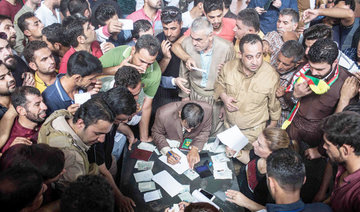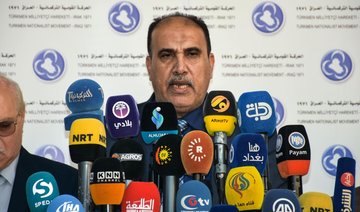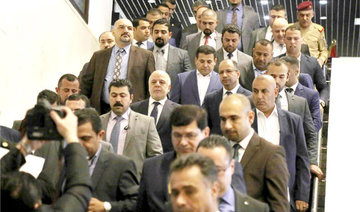BAGHDAD: Iraqi Vice President Ayad Allawi on Monday warned there could be a “civil war” over the Kurdish-administered city of Kirkuk if talks over Kurdish independence are left unresolved.
Allawi, in an interview with The Associated Press, urged Kurdish leader Masoud Barzani, as well as Iraq’s central government and its Iranian-backed militias, to show restraint and resolve their disputes over the oil-rich city.
Ruling out a military solution to the crisis, Ihssan Al-Shimari, an adviser to Iraqi Prime Minister Haidar Al-Abadi, told Arab News: “Talking about a civil war between Kurds and Arabs is an attempt to pressure both sides — Baghdad and Kurdistan — but the reality on the ground doesn’t indicate any of these expectations.”
Al-Shimari said: “The prime minister has flatly refused to fight Kurdish citizens and still relies on constitutional measures, which offer a wide range of options to the federal government to deal with the crisis.”
He added: “Kirkuk is a disputed area, and according to the constitution its administration has to go back to the Iraqi federal government.”
Kirkuk was included in Iraqi Kurdistan’s independence referendum last month, even though it falls outside the autonomous Kurdish region in the country’s northeast.
The ethnically mixed city has been administered by Kurdish forces since 2014, when the Iraqi military fled a Daesh advance.
The referendum was held despite strong objections from Baghdad, Ankara and Tehran. Barzani has not yet declared independence.
“Iraqis should be left alone to discuss their own problems without interference,” said Allawi. “Kirkuk has become a flashpoint.”
The head of the Asaib Al-Haq militia, Qais Khazali, on Sunday warned that the Kurds were planning to claim much of northern Iraq, including Kirkuk, for an independent state, after they voted for independence in a controversial but non-binding referendum two weeks ago.
He said it would be tantamount to a “foreign occupation,” reported the Afaq TV channel, which is close to the state-sanctioned militia.
Allawi, a former prime minister, said any move by the country’s Popular Mobilization Units (PMUs), which include Asaib Al-Haq, to enter Kirkuk would “damage all possibilities for unifying Iraq” and open the door to “violent conflict.”
He said if the government controls the PMUs, as it claims, it “should restrain them, rather than go into a kind of civil war.” Allawi also urged the Kurdish side “not to take aggressive measures to control these lands.”
Mohammed Naji, a lawmaker and a senior leader of Badr — one of the most prominent Iraqi Shiite militias — told Arab News: “It’s early to pick up the last option (confrontation). The federal government will use all available measures to contain the crisis, and using (military) power to impose federal authority (in Kirkuk) and preserve the unity of Iraqi lands and people will be the last option.”
Naji said: “From the beginning, we’ve said the referendum is unconstitutional. It violates the first item of the Iraqi constitution, and any action that aims to divide Iraq is unacceptable to all Iraqis.”
He added: “Resolving the problem of Kirkuk and the other disputed areas would be according to the constitution, and we can go back to talks (with the Kurds) under the umbrella of the constitution.”
He continued: “We’ve asked both parties (Baghdad and Irbil) to abide by the constitution, but if the Kurdish brothers insist on their stubbornness, this means they want to go with the hardest option, which is confrontation.”
Al-Abadi demanded that the Kurdistan Regional Government annul the referendum result, and called for joint administration of Kirkuk. Baghdad has closed Iraqi Kurdistan’s airspace to international flights.
Turkey and Iran have threatened punitive measures against the Kurdish region, fearing the encouragement of separatist sentiment among their own Kurdish populations.
Iraqi VP warns of ‘civil war’ over Kurdish-held Kirkuk
Iraqi VP warns of ‘civil war’ over Kurdish-held Kirkuk
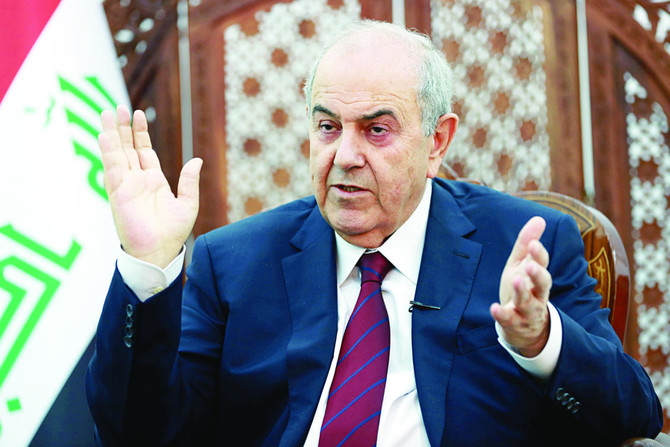
Afghan refugees stuck in Pakistan as Germany halts entry program

- Berlin halts at-risk Afghan resettlement as political shift curbs migration pathways
- Over 2,400 Afghans await entry as suspended admission program under review
BERLIN/ISLAMABAD, July 3 : In a cramped guesthouse in Pakistan’s capital, 25-year-old Kimia spends her days sketching women — dancing, playing, resisting — in a notebook that holds what’s left of her hopes.
A visual artist and women’s rights advocate, she fled Afghanistan in 2024 after being accepted on to a German humanitarian admission program aimed at Afghans considered at risk under the Taliban.
A year later, Kimia is stuck in limbo.
Thousands of kilometers away in Germany, an election in February where migration dominated public debate and a change of government in May resulted in the gradual suspension of the program.
Now the new center-right coalition intends to close it.
The situation echoes that of nearly 1,660 Afghans cleared to settle in the United States, but who then found themselves in limbo in January after US President Donald Trump took office and suspended refugee programs.
Kimia’s interview at the German embassy which she hoped would result in a flight to the country and the right to live there, was abruptly canceled in April.
Meanwhile, Germany pays for her room, meals and medical care in Islamabad.
“All my life comes down to this interview,” she told Reuters. She gave only her artist name for fear of reprisal.
“We just want to find a place that is calm and safe,” she said of herself and the other women at the guesthouse.
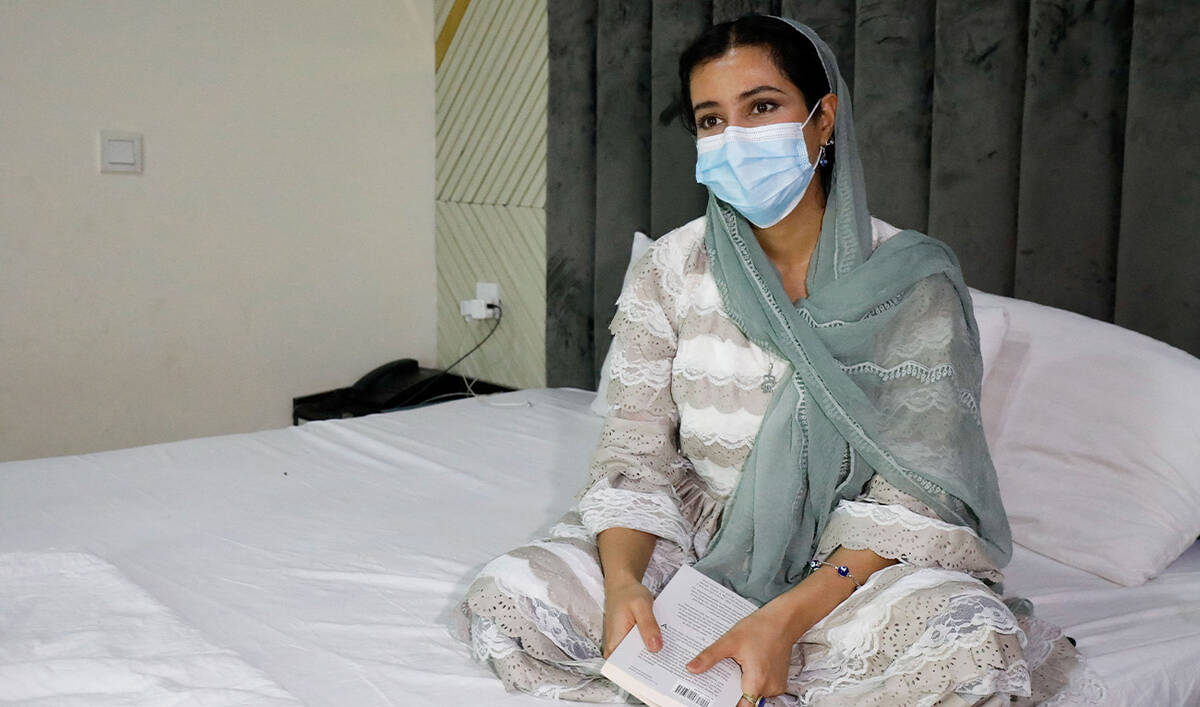
The admission program began in October 2022, intending to bring up to 1,000 Afghans per month to Germany who were deemed at risk because of their work in human rights, justice, politics or education, or due to their gender, religion or sexual orientation.
However, fewer than 1,600 arrived in over two years due to holdups and the cancelation of flights.
Today, around 2,400 Afghans are waiting to travel to Germany, the German foreign ministry said. Whether they will is unclear. NGOs say 17,000 more are in the early stages of selection and application under the now dormant scheme.
The foreign ministry said entry to Germany through the program was suspended pending a government review, and the government will continue to care for and house those already in the program.
It did not answer Reuters’ questions on the number of canceled interviews, or how long the suspension would last.
Reuters spoke with eight Afghans living in Pakistan and Germany, migration lawyers and advocacy groups, who described the fate of the program as part of a broader curb on Afghan asylum claims in Germany and an assumption that Sunni men in particular are not at risk under the Taliban.
The German government says there is no specific policy of reducing the number of Afghan migrants. However, approval rates for Afghan asylum applicants dropped to 52 percent in early 2025, down from 74 percent in 2024, according to the Federal Migration Office (BAMF).
POLITICAL SHIFT
Kabul fell to the Taliban in August 2021. Since May 2021 Germany has admitted about 36,500 vulnerable Afghans by various pathways including former local staff, the government said.
Thorsten Frei, chief of staff to Germany’s new chancellor Friedrich Merz, said humanitarian migration has now reached levels that “exceed the integration capacity of society.”
“As long as we have irregular and illegal migration to Germany, we simply cannot implement voluntary admission programs.”

The interior ministry said programs like the one for Afghans will be phased out and they are reviewing how to do so.
|Several Afghans are suing the government over the suspension. Matthias Lehnert, a lawyer representing them, said Germany could not simply suspend their admissions without certain conditions such as the person no longer being at risk.
Since former chancellor Angela Merkel opened Germany’s borders in 2015 to over a million refugees, public sentiment has shifted, partly as a result of several deadly attacks by asylum seekers. The far-right Alternative for Germany party (AfD), capitalizing on the anti-migrant sentiment, surged to a historic second-place finish in February’s election.
Afghans Reuters spoke with said they feared they were being unfairly associated with the perpetrators, and this was putting their own lives at risk if they had to return to Afghanistan.
“I’m so sorry about those people who are injured or killed ... but it’s not our fault,” Kimia said.
Afghan Mohammad Mojib Razayee, 30, flew to Germany from Cyprus in March under a European Union voluntary solidarity mechanism, after a year of waiting with 100 other refugees. He said he was at risk after criticizing the Taliban. Two weeks after seeking asylum in Berlin, his application was rejected.
He was shocked at the ruling. BAMF found no special protection needs in his case, a spokesperson said.
“It’s absurd — but not surprising. The decision-making process is simply about luck, good or bad,” said Nicolas Chevreux, a legal adviser with AWO counseling center in Berlin.
Chevreux said he believes Afghan asylum cases have been handled differently since mid-2024, after a mass stabbing at a rally in the city of Mannheim, in which six people were injured and a police officer was killed. An Afghan asylum seeker was charged and is awaiting trial.
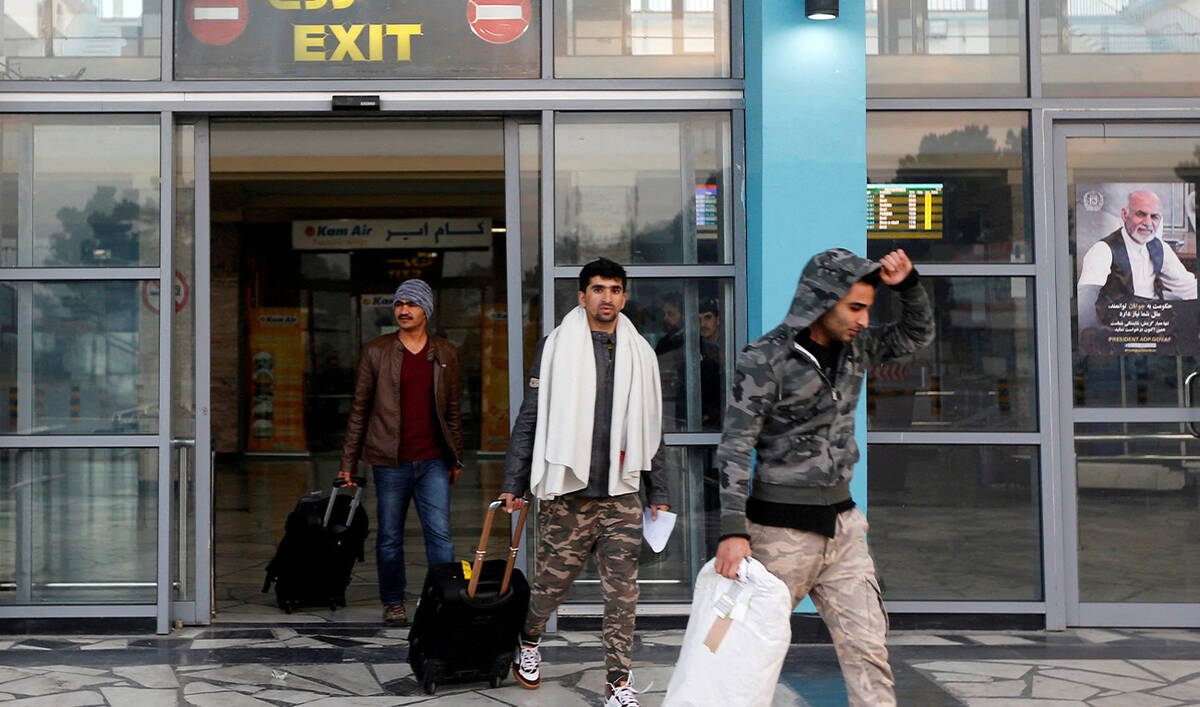
‘YOU DON’T LIVE’
Spending most days in her room, surrounded by English and German textbooks, Kimia says returning to Afghanistan is unthinkable. Her art could make her a target.
“If I go back, I can’t follow my dreams — I can’t work, I can’t study. It’s like you just breathe, but you don’t live.”
Under Taliban rule, women are banned from most public life, face harassment by morality police if unaccompanied by a male guardian, and must follow strict dress codes, including face coverings. When security forces raided homes, Kimia said, she would frantically hide her artwork.
The Taliban say they respect women’s rights in accordance with their interpretation of Islamic law and local culture and that they are not targeting former foes.
Hasseina, is a 35-year-old journalist and women’s rights activist from Kabul who fled to Pakistan and was accepted as an applicant on to the German program.
Divorced and under threat from both the Taliban and her ex-husband’s family, who she says have threatened to kill her and take her daughter, she said returning is not an option.
The women are particularly alarmed as Pakistan is intensifying efforts to forcibly return Afghans. The country says its crackdown targets all undocumented foreigners for security reasons. Pakistan’s foreign ministry did not respond to request for comment on how this affects Afghans awaiting German approval.
The German foreign ministry has said it is aware of two families promised admission to Germany who were detained for deportation, and it was working with Pakistan authorities to stop this.
Marina, 25, fled Afghanistan after being separated from her family. Her mother, a human rights lawyer, was able to get to Germany. Marina has been waiting in Pakistan to follow her for nearly two years with her baby.
“My life is stuck, I want to go to Germany, I want to work, I want to contribute. Here I am feeling so useless,” she said.
Liverpool’s Portuguese forward Diogo Jota dies in car crash in Spain

- Spanish police confirmed the death of Diogo Jota and his brother
MADRID: Liverpool's Portuguese forward Diogo Jota, 28, died in a car crash near Zamora in northwestern Spain with his brother, the Portuguese Football Federation said on Thursday.
The regional fire department of Castile and Leon, where Zamora is located, said on its website a car crashed early on Thursday, shortly after midnight, and burst into flames, with two men, aged 28 and 26, found dead.
"We have lost two champions. Their deaths represent irreparable losses for Portuguese football, and we will do everything we can to honour their legacy every day," the Portuguese Football Federation said in a statement.
Spanish police told Reuters they could not yet officially confirm the names of the deceased, but everything pointed to it being Jota and his brother. The Lamborghini they were travelling veered off the road, the spokesperson said.
The bodies have been taken to a forensics unit in nearby Zamora where autopsies will be performed, they said.
Jota, who got married on June 28, helped Liverpool win the Premier League last season and also won the FA Cup and League Cup with the Merseyside outfit.
Jota arrived at Anfield from Wolverhampton Wanderers in 2020 and scored 65 goals in 182 appearances for the club in all competitions.
He also made 49 appearances for Portugal, twice winning the UEFA Nations League.
China denies military base ambitions in Pacific Islands

- China has established a police presence in Solomon Islands, Kiribati and Vanuatu
- Former US Deputy Secretary of State Kurt Campbell urged the Trump administration to keep its focus on the region because China wanted to build bases in the Pacific Islands
SYDNEY: China’s embassy in Fiji denied on Thursday that Beijing wanted a military base or sphere of influence in the Pacific Islands, after Fiji’s Prime Minister Sitiveni Rabuka said islands were trying to cope with a powerful China seeking to spread its influence.
“The claims about China setting up a military base in the Pacific are false narratives,” an embassy spokesperson said in a statement.
“China’s presence in the Pacific is focused on building roads and bridges to improve people’s livelihoods, not on stationing troops or setting up military bases.”
Rabuka said on Wednesday his country had development cooperation with China, but was opposed to Beijing establishing a military base in the region. In any case, China did not need a base to project power in the region, he added.
China tested an intercontinental ballistic missile in September that flew over Fiji to land 11,000 km (6,800 miles) from China in the international waters of the Pacific Ocean.
“If they can very well target an empty space they can very well target occupied space,” Rabuka told the National Press Club in Canberra. Washington became concerned about China’s ambition to gain a military foothold in the
Pacific Islands in 2018 when Beijing sought to redevelop a naval base in Papua New Guinea and a military base in Fiji. China was outbid by Australia for both projects. The concern resurfaced in 2022 when China signed a security pact with Solomon Islands, prompting Washington to warn it would respond if Beijing established a permanent military presence. In November, the outgoing US Deputy Secretary of State Kurt Campbell urged the Trump administration to keep its focus on the region because China wanted to build bases in the Pacific Islands.
The Chinese embassy spokesperson said Fiji and China respect each other’s sovereignty.
“China has no interest in geopolitical competition, or seeking the so-called ‘sphere of influence’,” the statement added.
China has established a police presence in Solomon Islands, Kiribati and Vanuatu.
Saudi PMI rises to 57.2 in June as non-oil sector hits 3-month high

RIYADH: Saudi Arabia’s non-oil private sector expanded at its fastest pace in three months in June, supported by rising domestic demand, accelerated hiring, and a pickup in purchasing activity, a survey showed.
According to Riyad Bank’s Purchasing Managers’ Index compiled by S&P Global, the headline PMI rose to 57.2, up from the 55.8 figure recorded in May, signaling a strong improvement in business conditions and surpassing the long-run average of 56.9.
The index remains well above the neutral 50 mark, indicating sustained expansion across the Kingdom’s non-oil economy.
The robust growth in Saudi Arabia’s non-oil business activity aligns with the broader goals of the Vision 2030 program, which seeks to diversify the Kingdom’s economy and reduce its reliance on oil revenues.
Saudi Arabia’s PMI for June outpaced that of its regional peers, with the UAE and Kuwait recording readings of 53.5 and 53.1, respectively.
Naif Al-Ghaith, chief economist at Riyad Bank, said: “The latest reading reflects a strong improvement in overall business conditions, supported by higher output levels, rising demand, and an active labor market.”
He added: “Firms largely linked the pickup in activity to improving sales, new project starts, and better demand conditions, although the pace of output growth was softer compared to previous highs.”
In May, a report released by Saudi Arabia’s General Authority for Statistics revealed that the Kingdom’s gross domestic product grew 2.7 percent year on year in the first quarter, driven by strong non-oil activity.
Commenting on the GDP figures at the time, Minister of Economy and Planning Faisal Al-Ibrahim, who also chairs GASTAT’s board, noted that the contribution of non-oil activities to the Kingdom’s economic output reached 53.2 percent — an increase of 5.7 percent from previous estimates.
The minister also added that the Kingdom’s economic outlook remains positive, supported by structural reforms and high-quality, state-led projects across various sectors.
In its latest PMI report, S&P Global stated that non-oil firms in the Kingdom reported a further rise in new orders in June, with the rate of growth continuing to accelerate from its recent low in April.
Companies that participated in the survey noted that the acquisition of new clients and the benefits of enhanced marketing had improved demand growth across non-oil sectors.
“New orders continued to lead the expansion, registering the fastest growth in four months and surpassing the long-run trend. Businesses credited this increase to stronger demand, effective marketing strategies, and improved client acquisition,” added Al-Ghaith.
According to the report, non-oil private companies in Saudi Arabia hired staff at the fastest rate since May 2011, as firms expanded teams to manage increased workloads.
This historically strong increase continued a robust period of job creation seen since the start of 2025, with companies citing high demand for skilled staff as a driving force behind intensified recruitment efforts and increased salary offers.
Consequently, overall staff costs rose at the fastest pace since the survey began in 2009.
Purchasing activity accelerated to a two-year high as firms responded to rising input needs, with nearly 40 percent of respondents increasing their purchases.
Input prices also rose sharply, aligning with the trend observed in the second quarter of the year. This compelled companies to pass on higher costs to customers, although some businesses opted to reduce prices as part of competitive pricing strategies.
Despite price pressures, non-oil firms in Saudi Arabia remained confident of an uplift in activity over the next 12 months, with sentiment ticking up to a two-year high.
S&P Global stated that this optimism for future growth was largely driven by resilient domestic economic conditions, robust demand, and improving sales pipelines.
“On the future outlook, sentiment among non-oil businesses remains highly positive. Confidence about future activity climbed to a two-year peak, supported by healthy order pipelines and stronger domestic economic conditions. However, cost pressures became more pronounced in June,” said Al-Ghaith.
He noted that staff costs had risen at a record pace as firms sought to retain talent, while purchase prices recorded their fastest increase since February, partly due to stronger demand and rising geopolitical risks.
“Despite these cost challenges, firms broadly raised their selling prices, reversing the declines seen in May and signalling an improved ability to pass on higher costs to customers,” said Al-Ghaith.
The PMI survey data were collected from around 400 private sector companies across the manufacturing, construction, and wholesale sectors, as well as retail and services.
Pakistan PM Sharif heads to Azerbaijan for ECO summit focused on climate, trade

- Regional leaders gather in Baku to discuss sustainable development, connectivity
- PM Sharif expected to reaffirm Pakistan’s commitment to ECO Vision 2025
ISLAMABAD: Pakistani Prime Minister Shehbaz Sharif will be in Azerbaijan from today, Thursday, to attend the two-day 17th Economic Cooperation Organization (ECO) summit in Baku, where regional leaders will meet to discuss sustainable growth, climate resilience and increased intra-regional trade.
The theme of this year’s summit is “New ECO Vision for a Sustainable and Climate Resilient Future.” The ECO is a 10-member regional bloc comprising countries from Central and South Asia, the Caucasus, and the Middle East.
According to a report published in state broadcaster Radio Pakistan, Sharif will lead the Pakistani delegation and “share Pakistan’s perspective on key regional and global challenges.”
The report said he will also “reaffirm Pakistan’s commitment to the ECO Vision 2025 and advocate for enhanced intra-regional trade, transport connectivity, energy cooperation, and sustainable development.”
On the sidelines of the summit, Sharif is scheduled to hold bilateral meetings with other ECO leaders to discuss matters of mutual interest.
This marks Sharif’s second visit to Azerbaijan this year. He last traveled to Baku in May 2025, where he met with Azerbaijani President Ilham Aliyev and discussed deepening bilateral cooperation in energy and trade.
The ECO was established in 1985 by Iran, Turkiye, and Pakistan, and was expanded later to include Afghanistan, Azerbaijan, Kazakhstan, Kyrgyzstan, Tajikistan, Turkmenistan, and Uzbekistan. The organization aims to promote economic, technical, and cultural cooperation among member states.


